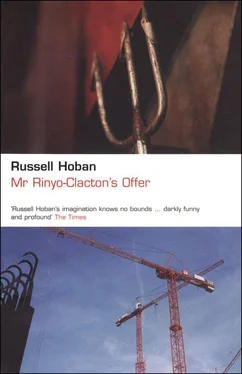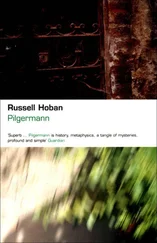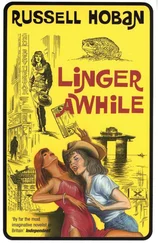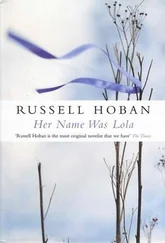I’m always early for every appointment, I can’t help it; it was only twenty past five when I reached the tube station and stood there smelling roasted chestnuts and waiting for Mr Rinyo-Clacton. ‘This could be the last time,’ he kept saying in my mind. How? Was it possible that he was dying, that he had tried to shelter from his own death in mine and now was relenting? I saw myself visiting him in hospital, being his comrade in his last moments. But the awful things he had done — his calculated seduction of Serafina and his various intrusions into our lives! How could I be the comrade of such a man? Whatever was about to happen, I felt now that he was the weak one and I was the strong one, and I liked that feeling.
Suddenly here came Katerina looking like a storm-driven ship about to smash itself on rocks. ‘Katerina!’ I said. She seemed not to hear me, but hurried into the station and down the stairs. I followed as she went through the turnstile with her travel permit; when I saw her go down to the westbound platform I bought a ticket to West Brompton and went down the stairs after her as a Wimbledon train pulled in.
Katerina made her way through the crowd, moving quickly past the refreshment kiosk, past the board that showed the incoming trains, past the Piccadilly Line stairs. She stopped by the next stairs as I caught up with her. The doors of the Wimbledon train stood open; passengers getting on pushed past those getting off as Mr Rinyo-Clacton stepped on to the platform and found himself face to face with Katerina.
‘Kandis?’ she said. She passed a hand over her eyes and shook her head in evident disbelief. ‘No, not possible — Theodor, is it you?’
Mr Rinyo-Clacton’s eyes opened very wide, his mouth was a silent O. He stepped back, the doors of the carriage closed on his coat, and the train moved out, dragging him along the platform and into the tunnel as people shouted and pointed. ‘No!’ I said. ‘Wait!’ But he was gone, and never said a word.
So here I am — Jonathan Fitch on Chapter 34 of my story. I’m very superstitious and superstition creates its own rules: I knew it would be wrong to contrive to end this with a chapter total the same as that of Melencolia’s magic square but I thought it would be a good omen if it fell out that way. That’s not going to happen now: melancholy yes; magic no.
When I saw Mr Rinyo-Clacton step back and get caught in the carriage doors I said, ‘No! Wait!’ A useless thing to say, I know, but I was overwhelmed by a sense of this thing being cut off short, being stopped unresolved. I was shocked by the taking-away of his death from me by this weird deus ex machina. Dea, rather, this old woman who suddenly finished off a man who’d become some kind of a cornerstone of my existence. There were so many things to be worked out before I could be the hero of my story, and now the process would never be complete and I’d never be that hero.
Platform 4 was taped off and the station closed. People streamed out into Earl’s Court Road, marvelling at the drama that had heightened their reality. I told a London Transport policeman that I was a close friend and he directed Katerina and me to Chelsea and Westminster Hospital.
‘Kandis?’ I said to Katerina, ‘Theodor Kandis, was that his name?’
‘That was his name.’
‘Who was he?’
She stifled a sob and shook her head. We took a taxi, and all the way to the hospital she sat with her hands over her face, speechlessly rocking back and forth.
Accident and emergency at Chelsea and Westminster Hospital: cloistered and quiet, full of quickness and slow time, close to but distant from the crawling traffic in the Fulham Road and the rain now making the streets shiny. Sister Melanie Quinn, large and well-built, reminded me of Melencolia, whose face, as I recalled it now, was quite a nice one, friendly even. She drew aside the curtain of the cubicle and there he was, completely submissive to Death.
‘There was no damage to his face,’ she said, and lifted the sheet. His face looked much smaller than usual, softer and younger, not sulking at all. The eyes were closed.
‘That’s him,’ I said. ‘T. Rinyo-Clacton.’
‘That’s him,’ said Katerina. ‘His face is just exactly the same as his father’s.’
‘Are you next of kin?’ said Sister Quinn.
‘I’m his mother,’ said Katerina.
36. The Face of Dieter Kandis
‘To know what is coming,’ said Katerina, ‘and to be able to do nothing about it is not good. When Hitler came to power in 1933 I was nine years old, but already when I was seven I was seeing in my dreams the railhead and the chimneys at the end of the journey. My father was a well-connected lawyer who thought of himself as more German than Jewish. He and my mother did not take my fears seriously, they thought I am a hysteric. When they finally realised what was happening it was already too late.
‘About Auschwitz I tell you only what concerns us now. I was on the list for medical experiments but this did not happen. Dieter Kandis was one of Mengele’s assistants. He helped with the experiments and he helped himself to any females he fancied. His name actually means ‘sugar-candy’. This was in 1942. I was eighteen then and pretty, and after he raped me he took me off the experiment list and installed me in his quarters.
‘He had a piano there and a good collection of music; he himself was not very advanced but when he found that I was he made me play for him every evening. He was particularly fond of Haydn sonatas. So I was a well-fed whore who played the piano while other women were tortured and starved and worked to death. And there was the smell from the crematoria. My parents by then were dead.
‘In 1943 I became pregnant by Kandis and he told me I will go back on the experiment list if I try to abort it. So I didn’t. The child, a son, was born on the fourth of November. Kandis named him Theodor, ‘gift of God’, and handed him over to the eugenics people for research in what they called ‘cross-breeding’. I didn’t see him again and for these many years I didn’t know if he is alive or dead. I don’t think he ever knew who his mother was.
‘Towards the end of 1944 I was again and again seeing Russian soldiers in my dreams. Kandis had me moved to the IG-Farben barracks where the forced-labour women lived. These workers did not get the famous Buna soup but were properly fed. He gave me some money and he said, ‘Thank you for the Haydn. Tschuss.’ Then I didn’t see him again.
‘When the Russians came in January 1945 I walked out of there with the forced-labour women, mostly Poles.’ She rubbed her left wrist. ‘Since then I have tried not to meet anyone else who was at Auschwitz.’
In the light of the blue bell-flower lamp her face was soft and dreamy. Her glass was empty and I filled it again. On her wall Melencolia also had a soft and dreamy look. A whole lot of woman, Melencolia: drawn by Dürer but promising opulence of the Rubens sort under her clothes. The child, perhaps I’d been too hard on him in the past; he was, after all, only a little fellow. Had he been crying? The dog was sleeping as before; the polyhedron flaunted its many facets. The sound of the rain and the drops running down the window panes curtained us in and made the room more cosy. I said to Katerina, ‘When I saw you hurrying to the tube station, did you know then … ’
‘That he was my son? I think I almost knew. In our very first session, when I suddenly pulled my hands away from yours it was because I saw the face of Dieter Kandis bending over me. I have seen his face often in dreams but this was a very strong apparition when I was fully awake. The second time it happened was when you put the bundle of money into my hands. It hit me like a bolt of lightning, I thought my heart would jump out of my body. It happened again when I held the book in my hands. Then, this afternoon, it was like a film in my head: this man with the face of Dieter Kandis on the Wimbledon train coming to Earl’s Court. When I saw him get off the train and I spoke to him, he looked at me as if the name hit him also like a bolt of lightning from the past.’
Читать дальше












